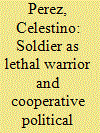| Srl | Item |
| 1 |
ID:
151010


|
|
|
|
|
| Summary/Abstract |
This short article answers the question of whether, in the context of current American civil–military relations, senior military professionals may loyally dissent from a decision by civilian authorities, even including by resignation. Stated another way, can their constitutional duties to obedience to civilian authority ever clash so severely with their responsibilities to their profession and its fiduciary trust with the American people that dissent is obligated. The position offered here is that senior military professionals always retain the moral agency for such dissent. It inheres in their role as a steward of an American military profession exercising the discretionary judgments that are the moral core of their professional work.
|
|
|
|
|
|
|
|
|
|
|
|
|
|
|
|
| 2 |
ID:
112370


|
|
|
|
|
| Publication |
2012.
|
| Summary/Abstract |
An adequate configuration of the military ethic, which encompasses the U.S. Army's professional and ethical self-understanding, should integrate the soldier's ethicopolitical obligations toward the indigenous other; that is, the person who lives where soldiers are deployed. The argument first posits a distinction between cosmopolitan and patriotic configurations of the soldier's obligations. David Petraeus's counterinsurgency guidance typifies the former; Matthew Moten's configuration of the professional military ethic typifies the latter. Second, Hannah Arendt's distinction between Work and Action instructs that one does not "build" a polity; political foundations are fugitive and unpredictable. Third, considering Arendt's theory and current missions, the soldier as a political agent cannot produce stability or build a nation with instrumental certitude; however, the soldier can foster conditions and intervene in ways to nudge circumstances toward a better state of affairs. Finally, military professionals should cultivate a cosmopolitan attitude informed by William Connolly's ethos of engagement to help them fulfill their obligations to the other.
|
|
|
|
|
|
|
|
|
|
|
|
|
|
|
|